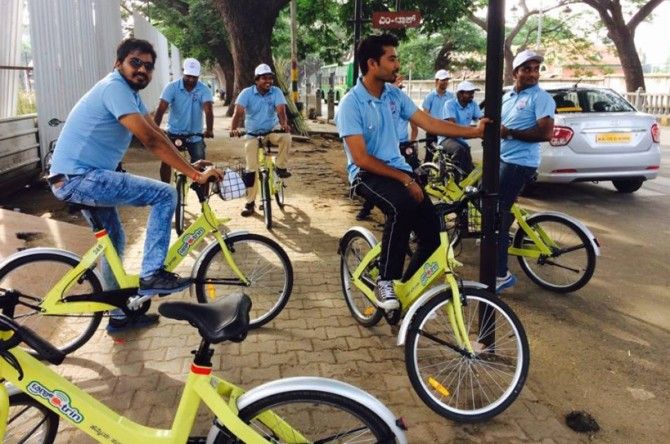In India, many cities lack bicycle lanes and proper pavements. This, coupled with heavily congested roads, creates a danger to cyclists. Furthermore, the low costs of bicycles may make it more economical to buy than to rent.

There have been strong rumours that Mobike, one of the Chinese companies that pioneered dockless bike-sharing around the world, is closing its international operations to focus on its home market.
Techcrunch reported that Mobike, once a start-up darling, is laying off its operations teams in Asia-Pacific including about 15 full-time employees, contract and third-party agency staff in Singapore,Malaysia, Thailand, India and Australia.
If the rumours are accurate, this could be the first step in a move that may see Mobike eventually withdrawing its operations internationally and focusing on China.
Bike-sharing or cycle renting was started as a Peking University cycling club project in 2014 to focus on bicycle tourism. It eventually morphed into bike-sharing and Ofo was the company that was launched as a result with initial funding from a Peking University alumnus.
Although the name “bike-sharing” suggests that users are sharing their bicycles, it is the company that owns and rents the bicycle to users. Users usually pay a small deposit for the right to use the bicycle and hire the bike using a mobile app which scans a QR code on the bicycle to unlock it and make payment.
Payment is usually cashless, and done via a mobile payment facilitator.
The bicycles are of simple construction and made cheaply using a steel frame without gears and solid puncture-proof tires. There is an internet-controlled lock as well as GPS locator built-in.
The concept behind this business was to solve the last mile problem faced by people commuting daily between their homes and public transport when this last mile is beyond comfortable walking distance. It also caters to longer rides in towns and cities which attracts a large number of tourists or people cycling for leisure.
Tencent-backed Mobike is not the first Chinese bike sharing company to enter India. Ofo was.
By the time it entered India Ofo had venture capital funding from Chinese technology firms Xiaomi, Didi Chuxing and Russian Digital Sky Technologies. It reached a valuation of USD 2 billion when tech giant Alibaba led an investment round that injected USD 866 million into the company in March of last year.
Despite being flushed with cash, Ofo, which was fully operational in Pune and Coimbatore and was running pilot projects in seven other cities, announced that it is pulling out of India. This was just after seven months in the market.
In May 2018, Mobike, China's largest bicycle sharing start-up, announced launch plans in India starting in Pune and expanding to 10 other cities in the next 18 months.
In Pune, it partnered local municipal authorities to spread awareness of the benefits of using shared bicycles, starting in the western suburb of Kothrud. It signed an agreement with the Pune Municipal Corporation, to operate in support of the municipality’s ambitious Pune Cycle Plan.
There are also a handful of local start-ups in this space like Gurugram-based Mobycy and Bengaluru’s Yulu and Zoomcar.
Mobike, with over 9 million orange bicycles operating in over 200 cities across 16 countries, was taken over by online food and retail delivery platform Meituan-Dianping, for USD 2.7 billion in April 2018.
Before this, it had raised more than USD 900 million from investors such as Tencent, Foxconn, Hillhouse Capital and Warburg Pincus.
Between 2017 to 2018, Mobike expanded operations to Singapore, Malaysia, Japan, Israel, Australia, UK, Germany, Italy, Netherlands, France, Albania, Mexico, Chile and the US. It has since pulled out of some locations.
Why have bike-sharing companies not been as successful as some of their investors envisaged?
In countries with low cost of living, low rentals were charged to make bicycle sharing attractive to the masses. In this business, high capital expenditure is required to build and deploy the bicycles in large numbers.
Ultimately in these countries, mounting costs and low revenues meant the business was unprofitable and unsustainable even with a long-term view.
In theory, these rental bicycles could be parked anywhere because they have GPS-locators. However, this did not take into account that many users would park the bicycles wherever they wanted at their convenience. They were blocking pedestrian walkways, pavements, public and handicap access areas causing clutter and obstruction.
This became so unsightly and so inconvenienced the general public that many complaints were lodged. As a result, municipal authorities put in place regulations which added to the costs of bike-sharing companies.
In Melbourne and Sydney, authorities had to hire disposal crews to cart away and destroy many of these bicycles which were in the way of public facilities or piled up in car parking lots.
There were also situations where bicycles were abused and abandoned. In Singapore, there were reports of people throwing bicycles down high-rise flats, into canals and rivers.
Unlike Uber or Airbnb, bike-sharing has no private ownership of physical assets and hence there is a lack of responsibility on the part of users. This has resulted in such a large number of theft and vandalism that some bike-sharing firms have withdrawn from the UK because of high replacement costs.
In India, many cities lack bicycle lanes and proper pavements. This, coupled with heavily congested roads, creates a danger to cyclists. Furthermore, the low costs of bicycles may make it more economical to buy than to rent.
As of February last year, the Chinese ministry of transport reported that over 20 out of 77 bike-sharing start-ups have shut down; five bike-sharing companies have gone bankrupt. Up to USD 150 million in deposits could not be refunded to users.
In Singapore, Singapore-based player oBike ceased operations last June and is now at the centre of a police investigation around alleged misuses of users’ deposits.
In spite of these setbacks, bike-sharing companies have been making optimistic comments in public.
They appear to be shutting businesses in countries where the economics of bike sharing does not work and focusing on countries where they can survive and maybe thrive.









